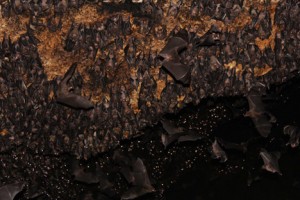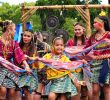
UNSUNG HEROES. Some two million fruitbats reside in five caves located in the Monfort property in Samal Island, Davao del Norte. These unique mammals are credited with being a major force in the reforestration of Mindanao's denuded forests and with pollination, particularly of Davao's beloved durian. Its insectivore relatives are also known to eat pests that destroy farmers' crops. (davaotoday.com photo by Medel V. Hernani)
Disturbed that bats are mainly associated to vampires, a Bats Reservation owner refers to her wards as “unsung heroes” and “angels of the night” as bats reforest the depleting forests and fly out every night to spread the seeds of the fruits that they eat.
By CJ KUIZON
Davao Today
SAMAL CITY Davao del Norte, Philippines — The public can now witness the world’s largest colony of fruit bats leaving caves en masse to forage during the rest of the year’s full moons. For this year, after all, was the ‘Year of the Bats,’ a two-year campaign by the United Nations Environmental Program, together with the Convention of Migratory Species of Wild Animals and the Agreement on the Conservation of Populations of European Bats.
Take it from Norma Monfort, fondly referred to as “Bat Mama,” whose family owns a spot in this island where an estimated two million fruit-eating bats make their home. She showed the “emergence” of the bats to the media and a select few during the 2012 Philippine launching of the ‘Year of the Bat’ at the Monfort Bat Reservation in Samal Island, Davao del Norte on February 8. That night was the first full moon after the Chinese New Year.
“They’re socializing,” she points to the bats with eyes lit up. “They’re grooming, keep grooming. They’re the cleanest animals. Parang pusa. Linis nang linis. (They’re like cats. They’re always cleaning and cleaning.)”
Wearing the medal given to her by the Disney Foundation for being one of the ‘Friends of the Earth,’ Monfort rattled on to the media other factoids about her wards.
Disturbed that bats are mainly associated to vampires, she refers to her wards as “unsung heroes” and “angels of the night.” She reiterated how bats reforest the depleting forests and fly out every night to spread the seeds of the fruits that they eat.
“Fruit and nectar-eating bats are equally important in maintaining whole ecosystems of plant life. In fact, their seed dispersal and pollination services are crucial to the regeneration of rain forests which are lung and rain makers of our planet,” said ecologist and leading conservationist Doctor Merlin Tuttle who is also honorary Year of the Bat ambassador.
Fruit bats are major pollinators of durian. “No bats, no durian. If you like durian, you have the bats to thank,” Monfort said.
Monfort also related how insectivore bats control the population of the insect pests that destroy farmers’ crops. “They help the farmers reduce the need to use pesticides.”
Like a proud mother, Monfort related how bats are the only flying mammals. She explains that they have ‘hand-wings,’ meaning their fingers extended to support the structure of their wings. During the Second World War, scientists tried in vain to replicate the bat wing and its flying technique.
She said the scientific community is also interested in the bats’ echo location system. This is the system where bats throw a high-pitched sound towards their prey and use the echo to locate them even in the darkest nights. Contrary to popular notion, bats are not really blind, for they can make use of their echo location technique to assist them in the dark.
In 2011, foreign scientists used thermal cameras and she saw how the bats go straight to the oceans after they emerge from the caves. She says this was very high technology and the American scientists had to have special permission just to take out the cameras out of the United States. She said she would like to find out why the bats did this, among other things.
Normally, the bat reservation is only open daily from 8 AM to 5 PM, thus closed by the time of the bat emergence. Guests may still get a good view of the bats during the daytime as the caves, though not located above ground, have large openings that are partially elevated. Though believed to be asleep during the day, bats are actually constantly active.
Last year, a nine-day “Bat camp” was the flagship event of the Year of the Bat launching. Foreign bat experts from the academe and field of research were on hand to conduct lectures, including a bat conservation forum, as well as workshops on the winged creatures. A national corporate sponsor put up a satellite disk and hooked Samal up to Bonn, Germany, where other bat conservationists and enthusiasts held a sponsorship dinner.
“I’m hoping that I can rally the people to rediscover solidarity and feel that sense of responsibility and shared ownership,” Monfort said. “I’m always saying that I’m not the owner. I’m just the steward. Let’s all help because it’s here. It should be here to stay for generations,” Monfort ends. (CJ Kuizon/davaotoday.com)
World









